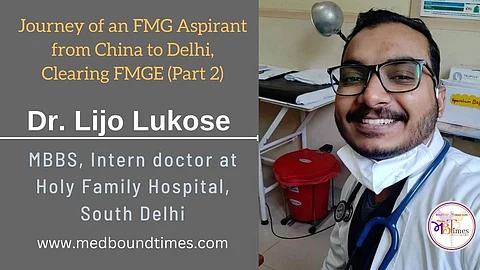There are both free and paid tests. By giving these tests, you will get an idea of how much you will score in FMGE. So, I would suggest you take any of the tests.
Realistically most of us won't be studying from the first year. Ideally, starting from the 5th year, one year is enough for cracking FMGE, and even 6 months are enough if you have a strategy.
The strategy followed by Dr. Lijo Lukaso
The strategy I followed was instead of studying for the whole syllabus of MBBS, I studied in the final year and focused on subjects that had the highest amount of marks like PSM, OBG, Medicine, and Surgery.
The thing about FMGE is that the medicine and surgery questions are completely clinically related, that's where the high conceptual-based questions come from. Whereas if you look at questions from PSM, biochemistry, and anatomy, they ask you in the form of a one-liner, they will paint a clinical picture and ask you as a one-liner. Those are easier to score compared to medicine and surgery questions. Now don’t get me wrong, you can attempt the medicine and surgery questions and get high marks if you have a really good clinical background, but usually, in that given stressful situation and in the heat of the moment you won't be thinking clearly, so there are high chances you might not get that right. So, the best bet is to get the maximum amount of marks in OBG, PSM, and Pre-meds, i.e., anatomy, biochemistry, physiology, and all. This is the strategy that I followed.
Different people have different strategies. If you start preparation from the first year, you can score points in each subject. But I was aiming toward the heavier subjects and that's where I scored the most.
Anas: What are your future plans? In which field would you like to pursue your PG degree?
Dr. Lijo: As of now, I do not have a lot of plans. I just want to work for some time in a clinical setting and get a hang of the clinical scenarios which I missed out on in my final years. In the future, I would like to pursue Internal Medicine.
Anas: Do you agree that clinical exposure is more prominent in India than abroad?
Dr. Lijo: The thing in India is that the clinical exposure you get is attributed to which college you are in. Like if you are in a government setting, in a government college, you are expected to leave the classroom and go to the hospital and continue your education there.
Now in private colleges, from the experiences that I have heard, even some of the well-known private colleges do an amazing job of teaching students. But, some private colleges are just there for the sake of being a medical college. They just admit the students and give them education but not much clinical exposure. It could be because of multiple reasons, like they are located in peripheries, where not many patients come there or they have a lack of funding, so all these kinds of issues are there when it comes to private medical colleges.
But if you are in a good medical college in India, the level of exposure you get is very good.
Now comparing this with the clinical exposure abroad, you will get this much exposure but in a different time frame. So, as I said earlier that in the Philippines they get it around 3rd year, and after their education, they have something called a clerkship which is kind of like an internship that they have to undergo. They have separate time allotted for this clerkship after every class.
Anas: Yes, even in Georgia we have something called a clerkship in our final years. Is it necessary to clear FMGE or are there other options for practicing medicine without qualifying for FMGE in India?
Dr. Lijo: So, I would like to talk about this internship a bit more. Every country has its own procedure for how they practice medicine and how medicine is taught. As you mentioned about the clinical experience in Georgia, the Philippines has its own and in the Caribbean islands it's different and likewise in China, it is completely different.
I feel that different countries have their own perspective to teach medicine. In the USA it's completely different. You do a BSc degree and then you get into a medical school, which is similar to what they follow in the Philippines.


